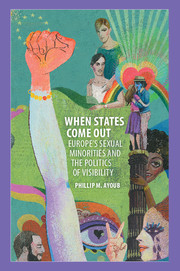Book contents
- Frontmatter
- Dedication
- Contents
- List of figures
- List of tables
- Preface and acknowledgments
- List of abbreviations
- 1 Introduction
- 2 The politics of visibility and LGBT rights in Europe
- 3 Transnational movement: Opportunities, actors, and mechanisms
- 4 Complying with new norms: LGBT rights legislation
- 5 Internalizing new norms: Attitudes toward sexual minorities
- 6 Poland and Slovenia's responses to international norms
- 7 Visibility in movement and transnational politics
- Methodological appendix
- References
- Index
- Books in the Series (continued from p. iii)
2 - The politics of visibility and LGBT rights in Europe
Published online by Cambridge University Press: 05 May 2016
- Frontmatter
- Dedication
- Contents
- List of figures
- List of tables
- Preface and acknowledgments
- List of abbreviations
- 1 Introduction
- 2 The politics of visibility and LGBT rights in Europe
- 3 Transnational movement: Opportunities, actors, and mechanisms
- 4 Complying with new norms: LGBT rights legislation
- 5 Internalizing new norms: Attitudes toward sexual minorities
- 6 Poland and Slovenia's responses to international norms
- 7 Visibility in movement and transnational politics
- Methodological appendix
- References
- Index
- Books in the Series (continued from p. iii)
Summary
Come out, stand up and let that world know. That would do more to end prejudice overnight than anybody would imagine. I urge them to do that, urge them to come out. Only that way will we start to achieve our rights.
– Harvey Milk, 1977In the 1980s, activists of the AIDS Coalition to Unleash Power (ACT UP) in New York coined the slogan “Silence = Death,” an expression that came to define much of the LGBT movement in that decade. In the spirit of Harvey Milk, who rejected what he called a “conspiracy of silence,” the activists were responding to the Reagan administration's silence on the HIV/AIDS epidemic that had brought the gay community to its knees. ACT UP adopted a logo that featured, above the words “Silence = Death,” a pink triangle symbolizing the patch that gay concentration camp prisoners were forced to wear during the Second World War (WWII). That historical context also evoked the theme of silence and death: in the 1940s, the silence of a nation and the silence of a social group resulted in death in the camps of Dachau, just as it did in the hospital beds of Chelsea in the 1980s. Equating silence with death is therefore neither new nor unique to a particular context. Indeed, nearly a century earlier in 1896, a German gay advocate (using the pseudonym Ludwig Frey) wrote that “Stillschweigen ist der Tod” (staying silent is death) (Beachy 2014, 107). At various points during the twentieth century, members of a marginalized group who sometimes had the ability to disguise their sexual orientation and gender identity were compelled to come out, to act up, and to make themselves visible.
Extending the logic of the “Silence = Death” campaign, I argue that visibility explains the transnational diffusion of LGBT rights in Europe. The premise that visibility leads to change is not new among European rights activists, many of whom share Harvey Milk's theory that gay and lesbian people should publicly declare their orientation if they wish to see society accept them (Herek 2004, 14). That said, they also caution that coming out – especially on an individual basis – is a privilege that can be more or less difficult depending on context (a point I return to at the end of this chapter).
- Type
- Chapter
- Information
- When States Come OutEurope's Sexual Minorities and the Politics of Visibility, pp. 21 - 52Publisher: Cambridge University PressPrint publication year: 2016
- 1
- Cited by



